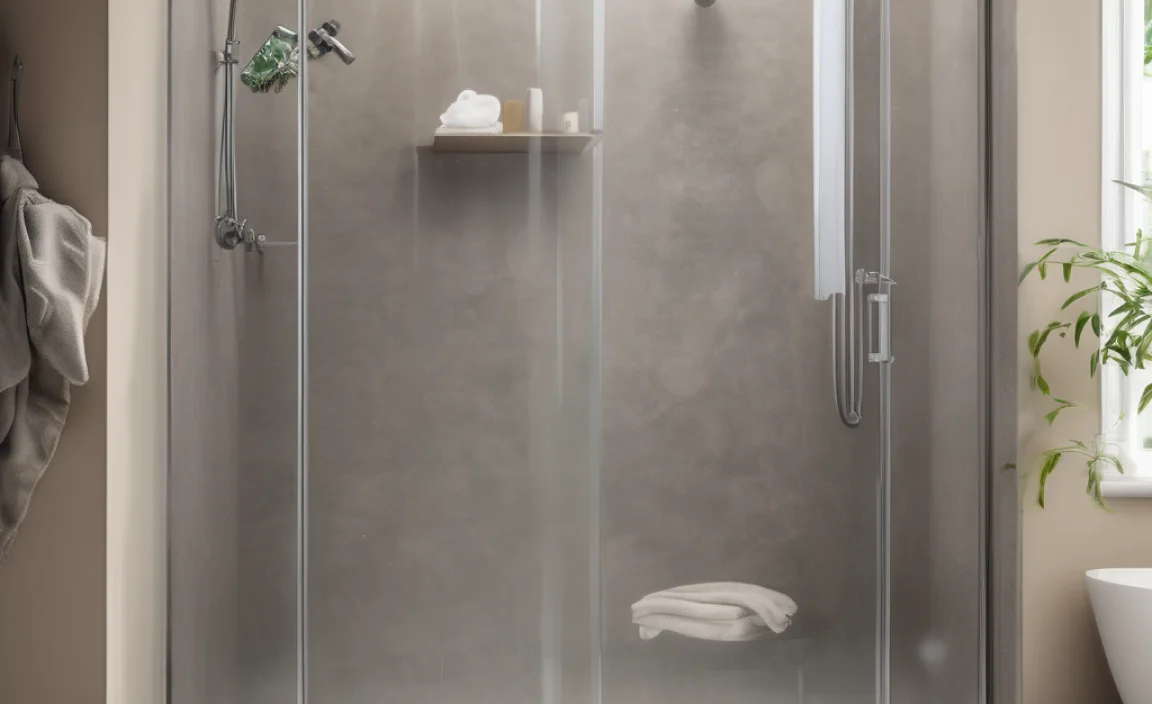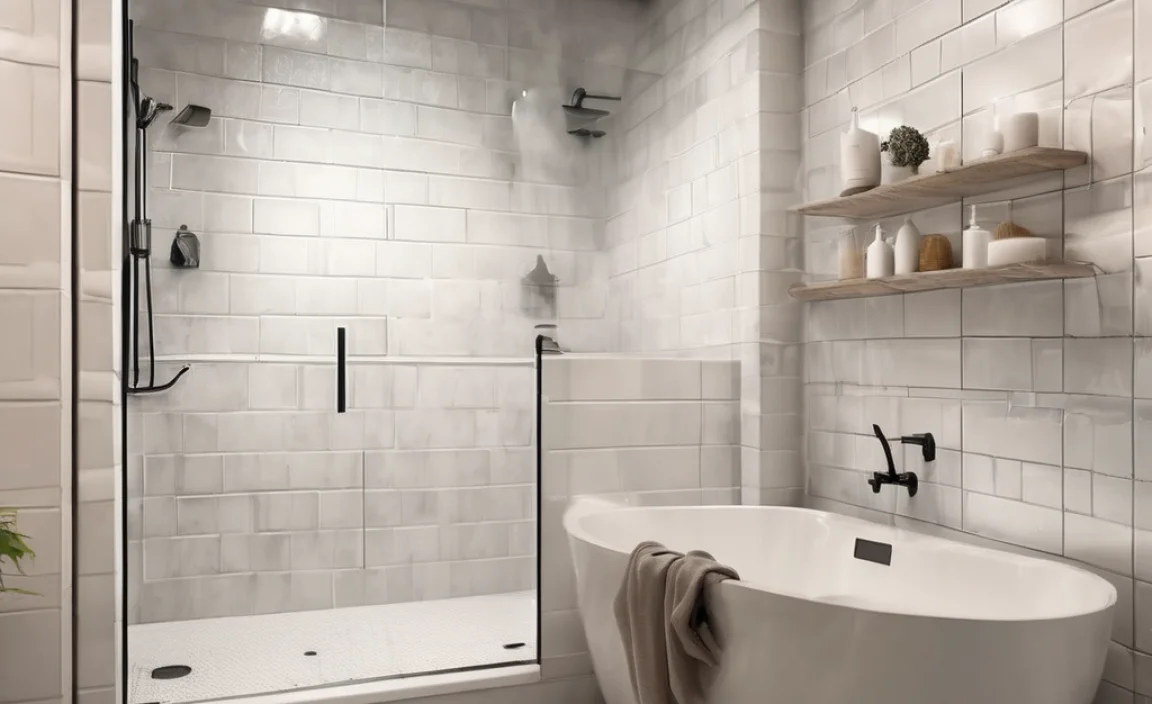Have you ever seen a dirty shower? It can look pretty gross. Soap scum and grime can build up fast. This makes your shower look old and yucky. But don’t worry! Learning how to clean fiberglass showers is easy. You can make your shower sparkle again.
Fiberglass showers are common. They are also easy to clean. With the right steps, your shower will shine. Let’s learn how to get it done!
Key Takeaways
- Always test your cleaning solution in a small area first.
- Regular cleaning prevents buildup and makes the job easier.
- Knowing how to clean fiberglass showers keeps them looking new.
- Use gentle products to avoid damaging the fiberglass surface.
- Vinegar and baking soda are great for tough stains and grime.
Easy Steps: How to Clean Fiberglass Showers

Cleaning your fiberglass shower doesn’t have to be a chore. The key is to use the right products. You should also follow a simple, effective method. Harsh chemicals can damage the fiberglass. Gentle cleaners are much better. They will protect the surface. They will also remove soap scum. It is important to clean regularly. Regular cleaning stops grime from building up. This makes cleaning easier each time. Are you ready to learn the steps? Let’s get started. We will make your shower shine like new. It’s all about using the right techniques. This will make your shower cleaning a breeze. It will also keep your bathroom fresh and clean.
- Rinse the shower with warm water.
- Mix gentle cleaner with water.
- Apply the solution with a soft cloth.
- Scrub gently in circular motions.
- Rinse thoroughly and dry with a towel.
When cleaning your fiberglass shower, remember to be gentle. Avoid using abrasive scrub brushes. These can scratch the surface. Instead, use a soft cloth or sponge. For tough stains, let the cleaner sit for a few minutes. This helps to loosen the grime. Always rinse well after cleaning. Soap residue can attract more dirt. Drying the shower after rinsing is also important. It helps prevent water spots and mildew. Keeping your shower clean is easy. Just follow these simple steps. A clean shower makes your whole bathroom feel fresh. Plus, it’s a healthier space for you and your family.
What Cleaners Are Safe to Use?
Choosing the right cleaner is super important. Some cleaners are too harsh. Harsh cleaners can damage fiberglass. Gentle cleaners work best. Look for products labeled as non-abrasive. These are safe for fiberglass surfaces. You can also make your own cleaner. A mix of vinegar and water works great. Baking soda is also good for scrubbing. Always test a small area first. This makes sure the cleaner doesn’t cause damage. Are you unsure what to use? Ask a parent or guardian for help. They can help you find the right cleaner. They can also show you how to use it safely. Remember, safety first when cleaning!
How Often Should I Clean My Shower?
How often you clean depends on how much you use the shower. If you use it every day, clean it once a week. This stops soap scum from building up too much. If you don’t use it often, clean it every other week. Regular cleaning makes the job easier. It also keeps your shower looking nice. Set a reminder to clean your shower. This way, you won’t forget. Cleaning regularly keeps your bathroom fresh. It also helps prevent mold and mildew. A clean shower is a happy shower!
What About Tough Stains?
Sometimes, you find tough stains in your shower. Don’t worry, you can still clean them! Make a paste of baking soda and water. Apply it to the stain. Let it sit for about 15 minutes. Then, scrub gently with a soft cloth. Vinegar is also good for stains. Spray vinegar on the stain. Let it sit for a few minutes. Then, wipe it away. For really tough stains, you might need a special cleaner. Ask a parent or guardian for help. They can find a cleaner that is safe for fiberglass. They can also help you use it correctly. Remember to always test a small area first. This makes sure the cleaner doesn’t damage the surface.
Fun Fact or Stat: Did you know that cleaning your shower regularly can prevent mold growth? Mold can cause health problems, so keeping your shower clean is super important!
The Best Cleaning Supplies for Fiberglass

Having the right supplies makes cleaning easier. You don’t need a lot of fancy tools. Just a few simple items will do. A soft cloth or sponge is essential. These won’t scratch the fiberglass. A spray bottle is useful for applying cleaners. You’ll also need a bucket for mixing solutions. Gloves protect your hands from cleaners. A scrub brush can help with tough stains. But make sure it’s a soft brush. Abrasive brushes can damage the surface. Having all your supplies ready makes cleaning faster. It also makes it more efficient. Are you ready to gather your supplies? Let’s get your shower sparkling clean!
- Soft cloths or sponges
- Spray bottle
- Bucket
- Gloves
- Soft scrub brush
- Non-abrasive cleaner
When choosing your cleaning supplies, think about what’s best for fiberglass. Avoid anything too rough or abrasive. This includes steel wool or scouring pads. These can scratch the surface. Instead, opt for gentle materials. Microfiber cloths are great for cleaning. They are soft and effective. They also won’t leave streaks. A good spray bottle helps you apply cleaner evenly. This makes cleaning more efficient. Gloves protect your hands from harsh chemicals. This is especially important if you have sensitive skin. A small scrub brush can help with tough spots. Just be sure it’s a soft brush. With the right supplies, you can keep your fiberglass shower looking great. It’s all about choosing the right tools for the job.
Why Are Soft Cloths Important?
Soft cloths are important because they protect the fiberglass. Fiberglass can scratch easily. Abrasive materials can cause damage. Soft cloths are gentle on the surface. They clean without scratching. Microfiber cloths are a great choice. They are super soft and absorbent. They also trap dirt and grime. Avoid using rough towels or paper towels. These can leave scratches. Using soft cloths keeps your shower looking new. It also extends the life of the fiberglass. So, always reach for a soft cloth when cleaning your shower.
What Kind of Spray Bottle Should I Use?
A good spray bottle is a must-have for cleaning. It helps you apply cleaner evenly. Look for a bottle that is easy to hold. It should also have an adjustable nozzle. This lets you control the spray pattern. A wide spray is good for covering large areas. A narrow spray is good for targeting stains. Make sure the bottle is made of durable plastic. This will prevent it from breaking easily. Clean the spray bottle after each use. This keeps it from getting clogged. A good spray bottle makes cleaning easier and more efficient.
Are Gloves Really Necessary?
Yes, gloves are really necessary! Cleaners can be harsh on your skin. They can cause dryness and irritation. Gloves protect your hands from these chemicals. Look for gloves that fit well. They should be comfortable to wear. Rubber gloves are a good choice. They are durable and waterproof. Clean your gloves after each use. This keeps them from getting dirty. Wearing gloves keeps your hands healthy. It also makes cleaning more pleasant. So, don’t forget your gloves when you clean!
Fun Fact or Stat: Did you know that using microfiber cloths can reduce the amount of cleaner you need? They are super absorbent and effective at trapping dirt!
Homemade Cleaners for Fiberglass Showers

You don’t always need store-bought cleaners. You can make your own! Homemade cleaners are often safer. They are also cheaper. Vinegar and baking soda are great for cleaning. They are natural and effective. Vinegar is good for removing soap scum. Baking soda is good for scrubbing stains. You can also use lemon juice. It smells nice and helps to cut through grime. Always test a small area first. This makes sure the cleaner doesn’t damage the surface. Making your own cleaners is easy. It’s also a great way to save money. It’s also better for the environment. Are you ready to try making your own cleaner?
- Vinegar and water solution
- Baking soda paste
- Lemon juice
- Dish soap and water
- Hydrogen peroxide
When making homemade cleaners, be careful. Some ingredients should not be mixed. For example, don’t mix vinegar and bleach. This can create dangerous fumes. Always use the right proportions. Too much of one ingredient can be harmful. Store your homemade cleaners in labeled bottles. This prevents accidents. Keep them out of reach of children and pets. Homemade cleaners are a great alternative. They are effective and safe. They are also better for the environment. Plus, they can save you money. It’s a win-win situation!
How Does Vinegar Clean?
Vinegar is a great cleaner because it’s acidic. The acid helps to break down soap scum. It also helps to dissolve hard water stains. Vinegar is also a natural disinfectant. It kills bacteria and germs. To use vinegar, mix it with water. A 50/50 solution works well. Spray the solution on the shower walls. Let it sit for a few minutes. Then, wipe it clean. Vinegar has a strong smell. But the smell will fade quickly. Vinegar is a safe and effective cleaner. It’s also a great choice for those with allergies.
Why Is Baking Soda a Good Scrubber?
Baking soda is a good scrubber because it’s mildly abrasive. It helps to loosen dirt and grime. It won’t scratch fiberglass surfaces. To use baking soda, make a paste with water. Apply the paste to the stain. Let it sit for about 15 minutes. Then, scrub gently with a soft cloth. Baking soda is also good for absorbing odors. It can help to freshen your shower. Baking soda is a safe and natural cleaner. It’s also very affordable. So, it’s a great choice for cleaning your shower.
Can Lemon Juice Really Clean?
Yes, lemon juice can really clean! It contains citric acid. Citric acid helps to break down grime and soap scum. Lemon juice also has a fresh, clean scent. To use lemon juice, squeeze it onto a cloth. Wipe down the shower walls. Let it sit for a few minutes. Then, rinse with water. Lemon juice is also good for removing hard water stains. It’s a natural and effective cleaner. Plus, it smells amazing! Lemon juice is a great way to keep your shower clean and fresh.
Fun Fact or Stat: Did you know that vinegar has been used as a cleaner for thousands of years? It’s a natural and effective way to keep things sparkling!
Preventing Soap Scum in Your Fiberglass Shower

Preventing soap scum is easier than removing it. Regular cleaning is key. Rinse your shower after each use. This washes away loose soap and grime. Use a squeegee to dry the walls. This prevents water spots. Good ventilation also helps. Open a window or turn on the fan. This reduces moisture. Moisture can lead to mold and mildew. Using liquid soap instead of bar soap helps. Bar soap leaves more residue. These simple steps can keep your shower clean. They also reduce the need for heavy cleaning. A little prevention goes a long way. It keeps your shower looking its best.
- Rinse after each use
- Use a squeegee
- Ensure good ventilation
- Use liquid soap
- Clean regularly
- Apply a water repellent
When preventing soap scum, think about your daily habits. Simple changes can make a big difference. For example, switch to a shower gel. Shower gels create less soap scum. Keep a squeegee in your shower. Use it after each shower. This takes just a few seconds. It prevents water spots and soap buildup. Make sure your bathroom is well-ventilated. This reduces moisture. Moisture promotes mold and mildew. These small changes can keep your shower clean. They also make cleaning easier. Prevention is always better than cure!
Why Is Rinsing Important?
Rinsing is important because it removes loose soap. It also washes away grime. This prevents buildup. Rinsing after each shower is a quick step. It makes a big difference. Use warm water to rinse. Warm water helps to dissolve soap. Rinse the walls, floor, and fixtures. This keeps your shower clean and fresh. Rinsing is a simple way to prevent soap scum. It also reduces the need for heavy cleaning. So, make rinsing a part of your daily routine.
How Does a Squeegee Help?
A squeegee helps by removing water from surfaces. This prevents water spots and soap buildup. Use a squeegee after each shower. Start at the top of the wall. Work your way down. Overlap each stroke. This ensures you remove all the water. Wipe the squeegee blade after each stroke. This keeps it clean. A squeegee is a simple tool. But it’s very effective. It keeps your shower looking clean and new. So, keep a squeegee in your shower and use it regularly.
Why Is Ventilation Necessary?
Ventilation is necessary to reduce moisture. Moisture promotes mold and mildew. Open a window or turn on the fan after showering. This helps to dry the shower. It also prevents moisture buildup. Good ventilation keeps your bathroom fresh. It also prevents musty odors. If you don’t have a window or fan, leave the door open. This allows air to circulate. Ventilation is important for a healthy bathroom. It also helps to prevent mold and mildew growth.
Fun Fact or Stat: Did you know that using a squeegee after each shower can reduce cleaning time by up to 50%?
Removing Mold and Mildew From Fiberglass

Mold and mildew can grow in damp showers. They can cause health problems. It’s important to remove them quickly. Vinegar is a good natural cleaner. It kills mold and mildew. Bleach is also effective. But use it carefully. Wear gloves and a mask. Make sure the room is well-ventilated. Baking soda can help scrub away mold. Mix it with water to make a paste. Apply the paste to the mold. Let it sit for a few minutes. Then, scrub gently. Rinse well after cleaning. Preventing mold is easier than removing it. Keep your shower dry and well-ventilated.
| Cleaner | Pros | Cons | How to Use |
|---|---|---|---|
| Vinegar | Natural, safe, effective | Strong smell | Spray, let sit, rinse |
| Bleach | Very effective | Harsh, strong fumes | Dilute, apply, rinse carefully |
| Baking Soda | Gentle, abrasive | Requires scrubbing | Make paste, apply, scrub, rinse |
| Hydrogen Peroxide | Safe, effective | May lighten surfaces | Spray, let sit, rinse |
When removing mold and mildew, safety is important. Always wear gloves and a mask. This protects you from chemicals and spores. Make sure the room is well-ventilated. Open a window or turn on the fan. This prevents fumes from building up. Test your cleaner in a small area first. This makes sure it doesn’t damage the fiberglass. Rinse well after cleaning. This removes all traces of the cleaner. Preventing mold is the best approach. Keep your shower dry and clean. This stops mold from growing in the first place.
How Does Vinegar Kill Mold?
Vinegar kills mold because it’s acidic. The acid breaks down the mold’s structure. It also prevents it from growing. To use vinegar, spray it on the mold. Let it sit for about an hour. Then, wipe it clean. You can also use a stronger solution. Mix vinegar with baking soda. This creates a powerful cleaning paste. Vinegar is a natural and safe way to kill mold. It’s also a good choice for those with allergies. So, reach for vinegar when you see mold in your shower.
Is Bleach Safe to Use?
Bleach is effective at killing mold. But it’s also harsh. It can damage surfaces. It can also irritate your skin and lungs. Always use bleach carefully. Wear gloves and a mask. Make sure the room is well-ventilated. Dilute the bleach with water. Use the recommended amount. Never mix bleach with other cleaners. This can create dangerous fumes. Rinse well after using bleach. This removes all traces of the chemical. Bleach should be used as a last resort. Only use it if other cleaners don’t work.
What If the Mold Keeps Coming Back?
If mold keeps coming back, you need to find the source. The source is usually moisture. Check for leaks in your shower. Repair any leaks you find. Make sure the room is well-ventilated. This helps to dry the shower. Clean your shower regularly. This prevents mold from growing. You can also use a mold-resistant sealant. This helps to prevent mold from returning. If the problem is severe, call a professional. They can help you find and fix the source of the moisture.
Fun Fact or Stat: Did you know that mold can start growing in as little as 24 hours in a damp environment?
Maintaining Your Clean Fiberglass Shower
Keeping your shower clean is an ongoing task. Regular maintenance prevents buildup. It also makes cleaning easier. Rinse your shower after each use. Use a squeegee to dry the walls. Clean your shower weekly. This stops grime from building up. Check for leaks and repair them. This prevents moisture and mold. Use gentle cleaners. Harsh cleaners can damage the fiberglass. Maintaining your shower keeps it looking new. It also extends its life. A little effort goes a long way.
- Rinse after each use
- Use a squeegee regularly
- Clean weekly
- Check for leaks
- Use gentle cleaners
- Apply protective sealant
When maintaining your shower, think about the long term. Regular cleaning prevents damage. It also keeps your shower looking its best. Use a protective sealant. This helps to repel water and soap scum. Choose the right cleaning products. Gentle cleaners are better for fiberglass. Avoid abrasive cleaners. These can scratch the surface. Make small changes to your routine. These changes can make a big difference. For example, switch to liquid soap. This reduces soap scum. Maintaining your shower is easy. Just follow these simple steps.
How Often Should I Seal My Shower?
Sealing your shower helps to protect it. It also repels water and soap scum. You should seal your shower every 6-12 months. This depends on how often you use it. Clean the shower thoroughly before sealing. This removes any dirt or grime. Apply the sealant according to the instructions. Let it dry completely before using the shower. Sealing your shower keeps it looking new. It also extends its life. So, make sealing a part of your maintenance routine.
What Happens If I Don’t Maintain My Shower?
If you don’t maintain your shower, it will get dirty. Soap scum will build up. Mold and mildew will grow. The fiberglass can become damaged. Cleaning will become more difficult. The shower will look old and worn. Neglecting your shower can also lead to health problems. Mold and mildew can cause allergies. Maintaining your shower is important. It keeps it clean, healthy, and looking its best.
How Can I Make Cleaning Easier?
There are many ways to make cleaning easier. Rinse your shower after each use. Use a squeegee to dry the walls. Clean your shower weekly. These simple steps prevent buildup. Use gentle cleaners. Harsh cleaners can damage the fiberglass. Keep your cleaning supplies handy. This makes it easier to clean. Enlist help from family members. This makes the job faster. Making cleaning easier is all about prevention. A little effort goes a long way.
Fun Fact or Stat: Did you know that regular cleaning can add years to the life of your fiberglass shower?
Summary
Keeping your fiberglass shower clean is easy with the right steps. You should always use gentle cleaners. Harsh chemicals can damage the surface. Regular cleaning prevents soap scum and mold. This makes your shower look new. Knowing how to clean fiberglass showers involves simple steps. These steps include rinsing, cleaning, and drying. Homemade cleaners like vinegar and baking soda are also effective. They are safe for the environment. They are also safe for your shower. Preventing soap scum is easier than removing it. Use a squeegee and ensure good ventilation. Maintaining your shower is an ongoing task. It’s worth the effort. A clean shower is a happy shower.
Conclusion
Cleaning your fiberglass shower is important. It keeps your bathroom fresh. It also prevents mold and mildew. Use gentle cleaners and soft cloths. Rinse and dry after each use. Regular cleaning makes the job easier. You can even make your own cleaners. With these tips, how to clean fiberglass showers will be a breeze. Enjoy your sparkling clean shower!
Frequently Asked Questions
Question No 1: What is the best way to clean a fiberglass shower?
Answer: The best way to clean a fiberglass shower is to use a gentle, non-abrasive cleaner. Harsh chemicals can damage the fiberglass surface. You can use a store-bought cleaner or make your own. A mixture of vinegar and water works well. Baking soda is also good for scrubbing. Always rinse the shower thoroughly after cleaning. This removes any residue. Regular cleaning prevents buildup. It also keeps your shower looking new. Remember to dry the shower after cleaning. This prevents water spots and mildew.
Question No 2: Can I use bleach to clean my fiberglass shower?
Answer: Yes, you can use bleach to clean your fiberglass shower. But you should use it with caution. Bleach can be harsh. It can also damage the fiberglass if used incorrectly. Always dilute bleach with water. Use the recommended amount. Wear gloves and a mask. Make sure the room is well-ventilated. Never mix bleach with other cleaners. This can create dangerous fumes. Rinse the shower thoroughly after using bleach. This removes all traces of the chemical. Consider using a milder cleaner first. See if that works before resorting to bleach.
Question No 3: How do I remove soap scum from my fiberglass shower?
Answer: Soap scum can be tough to remove. But there are several ways to do it. A mixture of vinegar and water works well. Spray it on the soap scum. Let it sit for a few minutes. Then, scrub gently with a soft cloth. Baking soda is also good for scrubbing. Make a paste with water. Apply it to the soap scum. Let it sit for a few minutes. Then, scrub gently. You can also use a store-bought soap scum remover. Follow the instructions carefully. Regular cleaning prevents soap scum buildup. This makes it easier to clean in the future. Now you know how to clean fiberglass showers from soap scum.
Question No 4: How often should I clean my fiberglass shower?
Answer: How often you clean your shower depends on how much you use it. If you use it every day, clean it once a week. This prevents soap scum and grime from building up. If you don’t use it often, clean it every other week. Regular cleaning makes the job easier. It also keeps your shower looking nice. Set a reminder to clean your shower. This way, you won’t forget. Cleaning regularly keeps your bathroom fresh. It also helps prevent mold and mildew. A clean shower is a happy shower!
Question No 5: What kind of cleaners should I avoid using on my fiberglass shower?
Answer: You should avoid using abrasive cleaners on your fiberglass shower. Abrasive cleaners can scratch the surface. This can damage the fiberglass. Avoid using steel wool, scouring pads, and harsh chemicals. These can all damage the surface. Instead, use gentle, non-abrasive cleaners. Look for products labeled as safe for fiberglass. You can also make your own cleaner. A mixture of vinegar and water works well. Baking soda is also good for scrubbing. Always test a small area first. This makes sure the cleaner doesn’t cause damage.
Question No 6: How do I prevent mold and mildew from growing in my fiberglass shower?
Answer: Mold and mildew thrive in damp environments. To prevent them from growing, keep your shower dry. Rinse the shower after each use. Use a squeegee to dry the walls. Make sure the room is well-ventilated. Open a window or turn on the fan. Clean your shower regularly. This prevents mold and mildew from building up. You can also use a mold-resistant sealant. This helps to prevent mold from returning. By following these steps, you can keep your shower clean and healthy. Knowing how to clean fiberglass showers also includes preventing mold.



